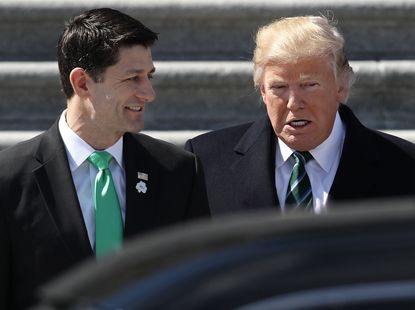There is no dealmaker on Earth crafty enough to save TrumpCare
The GOP is simply stuck — and no amount of negotiating can save it


Republicans' ObamaCare repeal is becoming more fraught by the day. Both President Trump and Speaker of the House Paul Ryan now concede that changes must be made to the American Health Care Act before it can have any hope of becoming law. But a retreat back to the drawing board won't be easy.
Trump thinks he can play "arbitrator" between GOP factions clashing over the substance of the bill. "It's very preliminary," he told Fox News' Tucker Carlson on Wednesday. "A lot of things aren't consistent [with his campaign]. But these are going to be negotiated."
To which I would respond: How? Any change to the bill to appease one Republican faction will inevitably alienate the other. Trump and the GOP are caught in a real bind of their own making.
Subscribe to The Week
Escape your echo chamber. Get the facts behind the news, plus analysis from multiple perspectives.

Sign up for The Week's Free Newsletters
From our morning news briefing to a weekly Good News Newsletter, get the best of The Week delivered directly to your inbox.
From our morning news briefing to a weekly Good News Newsletter, get the best of The Week delivered directly to your inbox.
The AHCA had been on the ropes from the moment Ryan unveiled it. Then came the disastrous Congressional Budget Office score this week. The nonpartisan agency forecasts that the bill would cause 24 million people to lose their insurance by 2026 and out-of-pocket costs to soar. This dismal forecast has almost certainly kneecapped the AHCA's chances of passing as it is.
But any attempt to rehabilitate the bill will only further strain the Republican Party. Improving the CBO score, and providing better coverage for more people, will require spending more — which will lose conservative votes. But taking steps to win over conservatives by cutting back subsidies and government coverage will make the CBO score worse — scaring off moderates.
For instance, one of the key sticking points for House conservatives has been the AHCA's delayed repeal of ObamaCare's Medicaid expansion. Trump hinted to conservatives that he would be willing to move the end date for the Medicaid expansion up to 2018 from 2020. But this would only worsen the CBO score by throwing more people off their insurance faster. And such a change would drive away Senate Republicans in states that count on the Medicaid expansion for coverage.
On the other hand, any change to mollify moderates in the Senate will antagonize hardline conservatives. A group of Senate Republicans told the White House that the bill must be revised to produce "lower insurance costs for poorer, older Americans and an increase in funding for states with high populations of hard-to-insure people."
This will require more government spending and more redistribution in order to, in the words of Sen. Jon Thune (R-S.D.), make the bill "more helpful to people on the lower end." It would effectively make the replacement even more like ObamaCare.
It would also improve the bill's coverage numbers from the CBO. But it would be a nonstarter for arch-conservatives like Sen. Ted Cruz (R-Texas) and the House Freedom Caucus. Those who objected to the AHCA as so-called "ObamaCare Lite" — the "the largest welfare program ever proposed by the Republican Party," in the words of Rep. Mo Brooks (R-Ala.) — will wage an all-out mutiny against any "ObamaCare Barely-Lite" that comes out of the Senate.
This tension is the product of longstanding contradictions in the Republican Party's thinking and rhetoric about health care. Conservatives are sticking to their ideological opposition to government intervention to guarantee health insurance for people. But for years, most of the Republican Party has campaigned on a much narrower practical opposition to certain outcomes under ObamaCare — specifically, its impact on premiums and out-of-pocket costs for consumers.
The problem is that these practical problems simply cannot be solved through conservative policymaking. Providing better quality, broadly available insurance coverage — as Republicans from Trump on down repeatedly promised to do — requires more government spending and intervention, not less.
The GOP has boxed itself in politically, too. After seven years railing against ObamaCare, anything less than a total repeal and replacement of the law will look like a devastating defeat under unified Republican government.
That didn't have to be the case.
After Barack Obama's re-election in 2012, then-Speaker John Boehner urged Republicans to give up the ObamaCare wars, declaring it the settled "law of the land." Had Boehner's party followed his lead, it would not be in the position of having to go big or slink home today. Relatively small conservative tweaks to the law would have been hailed as a win.
In fact, ObamaCare adopted a fundamentally conservative method of providing near-universal care: privately run insurance coupled with regulations, mandates, and government subsidies. Had Republicans managed expectations over the past seven years, they could have worked within this framework to implement a few conservative ideas, such as allowing insurance sales across state lines or permitting insurers to charge older people significantly more than younger people.
Instead, the GOP persisted in trying to delegitimize the law as an avatar for the Obama administration. They made the arguments about premiums and deductibles that they knew would be popular, all the while knowing that their own solutions would be deeply unpopular.
Now, Republicans are navigating widening political fault lines between the factions within their party. Ryan is simply hoping to dump the AHCA hot potato into the Senate's lap so it can become Mitch McConnell's problem. If Ryan can muscle the bill through the House, The New York Times reports, he would "leave it to Senate Republicans to decide if they want to be the ones to refuse to honor the longstanding Republican promise to repeal the law."
The problem is that the GOP has made conflicting promises about how it would legislate around health care. The party is stuck between its conservative principles and the pragmatic assurances it made to the American public. And it has no one to blame but itself.
Sign up for Today's Best Articles in your inbox
A free daily email with the biggest news stories of the day – and the best features from TheWeek.com
Joel Dodge writes about politics, law, and domestic policy for The Week and at his blog. He is a member of the Boston University School of Law's class of 2014.
-
 Why are lawmakers ringing the alarms about New Jersey's mysterious drones?
Why are lawmakers ringing the alarms about New Jersey's mysterious drones?TODAY'S BIG QUESTION Unexplained lights in the night sky have residents of the Garden State on edge, and elected officials demanding answers
By Rafi Schwartz, The Week US Published
-
 10 upcoming albums to stream in the frosty winter
10 upcoming albums to stream in the frosty winterThe Week Recommends Stay warm and curled up with a selection of new music from Snoop Dogg, Ringo Starr, Tate McRae and more
By Justin Klawans, The Week US Published
-
 David Sacks: the conservative investor who will be Trump's crypto and AI czar
David Sacks: the conservative investor who will be Trump's crypto and AI czarIn the Spotlight Trump appoints another wealthy ally to oversee two growing — and controversial — industries
By David Faris Published
-
 US election: who the billionaires are backing
US election: who the billionaires are backingThe Explainer More have endorsed Kamala Harris than Donald Trump, but among the 'ultra-rich' the split is more even
By Harriet Marsden, The Week UK Published
-
 US election: where things stand with one week to go
US election: where things stand with one week to goThe Explainer Harris' lead in the polls has been narrowing in Trump's favour, but her campaign remains 'cautiously optimistic'
By Harriet Marsden, The Week UK Published
-
 Is Trump okay?
Is Trump okay?Today's Big Question Former president's mental fitness and alleged cognitive decline firmly back in the spotlight after 'bizarre' town hall event
By Harriet Marsden, The Week UK Published
-
 The life and times of Kamala Harris
The life and times of Kamala HarrisThe Explainer The vice-president is narrowly leading the race to become the next US president. How did she get to where she is now?
By The Week UK Published
-
 Will 'weirdly civil' VP debate move dial in US election?
Will 'weirdly civil' VP debate move dial in US election?Today's Big Question 'Diametrically opposed' candidates showed 'a lot of commonality' on some issues, but offered competing visions for America's future and democracy
By Harriet Marsden, The Week UK Published
-
 1 of 6 'Trump Train' drivers liable in Biden bus blockade
1 of 6 'Trump Train' drivers liable in Biden bus blockadeSpeed Read Only one of the accused was found liable in the case concerning the deliberate slowing of a 2020 Biden campaign bus
By Peter Weber, The Week US Published
-
 How could J.D. Vance impact the special relationship?
How could J.D. Vance impact the special relationship?Today's Big Question Trump's hawkish pick for VP said UK is the first 'truly Islamist country' with a nuclear weapon
By Harriet Marsden, The Week UK Published
-
 Biden, Trump urge calm after assassination attempt
Biden, Trump urge calm after assassination attemptSpeed Reads A 20-year-old gunman grazed Trump's ear and fatally shot a rally attendee on Saturday
By Peter Weber, The Week US Published